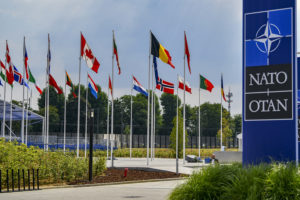
NATO headquarters as U.S. Secretary of State Michael R. Pompeo departs the NATO summit in Brussels, Belgium on July 12, 2018. [State Department photo/ Public Domain]
To clear the air up front: Trump has not possessed laser-like precision or been a model of coherence when it comes to his remarks on the almost 70-year old alliance. First NATO was “obsolete,” then a year later Trump remarked that “I said it was obsolete. It’s no longer obsolete,” without specifying what had brought it out of obsolescence.
It is tough to defend anything Trump says, because one winds up having to try to deny or explain away the various conflicting things he says on any subject. In this case, intellectual clarity and honesty prevent us from defending both “obsolete” and “not obsolete” in the span of a year. Trump is gonna Trump.
So let’s try it a different way: The Donald Trump who sounded like he was trying to agree with me on NATO was right. The other Trump was wrong.
NATO member states don’t “owe” the United States anything in a legal or even political sense for not having spent 2% of GDP on defense, as PolitiFact gleefully pointed out after Trump’s latest garbled outburst. Moreover, one can hardly blame the Europeans for taking a cheap ride on the American taxpayer, especially considering that the United States has been the leading state in favor of growing the NATO balance sheet by extending its Article 5 commitment to an array of tiny, militarily indefensible states on the Russian border.
Trump’s real beef is, or ought to be, with the American foreign policy establishment. While admittedly a less politically appealing target than Europe, it’s the Beltway foreign policy elite that’s responsible for creating this state of affairs. While the original concept behind NATO was, in Lord Ismay’s apocryphal framing, to “keep the Americans in, the Russians out, and the Germans down,” after the Cold War, keeping the Russians out became less of a concern for Washington than keeping Europe down, keeping Washington in charge, and expanding NATO as far as possible.
The radicalism of this policy is laid bare when one considers the hysteria among Beltway types when, in the 1990s, the Europeans took baby steps toward integrating their foreign and defense policies with one another. John Bolton howled that it was “a dagger pointed at the heart of NATO.” US Ambassador to NATO Nicholas Burns deemed European cooperation “one of the greatest dangers to the transatlantic relationship” in general. Madeleine Albright gave a speech demanding that any European effort not engage in any of the “Three Ds”: Europe was told to avoid
- de-linking [European security cooperation] from NATO;
- duplicating existing (read: NATO) efforts; and
- discriminating against non-EU members.
In other words, via NATO, the United States will stay at the center of European security policy, thank you very much.
As a point of contrast, President Eisenhower declared in 1951 that “if in 10 years, all American troops stationed in Europe for defense purposes have not been returned to the United States, then this whole project will have failed.” How things have changed…
There’s an ongoing danger that establishment types will attempt to use Trump as the face of restraint and realism. Given the lack of consideration Trump seems to have given these topics, his personnel choices, and his erratic manner, realists should be wary of letting people assert that Trump is their advocate.
At the same time, and this is a delicate needle to thread, we should use the instances in which the president says something sensible at the very least as a jumping off point for inserting a viewpoint–in this case, skepticism of NATO–into the discussion. Realists need to take the opportunities they’re given without signing on to any politician’s broader program.





